Dear Artist,
In 1987, speculative fiction writer Ursula Le Guin wrote an essay entitled Where Do You Get Your Ideas From? Le Guin suggested that there are two myths about how fiction is written: the first being that there is a secret to being a writer, and that all you have to do is know the secret and you will become one. The second myth is that stories come from ideas. Her essay was an attempt to address these myths and to try to break down the mechanics of storytelling as what she saw as abstract components, and what fiction writing really is – an abstraction of the imagination in the form of patterns. To Le Guin, these patterns, when working in concert, then create an emotional experience that is beyond language.
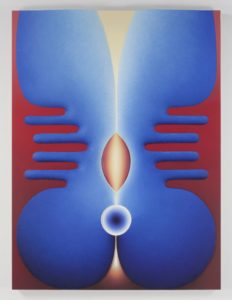
Touchy Subject, 2018
Oil paint, acrylic medium, sawdust, and high-density foam on linen mounted on panel
48 × 36 × 3 inches
by Loie Hollowell (b. 1983)
Of the notion that stories come from ideas, “The more I think about the word “idea,” the less idea I have what it means,” Le Guin wrote. “I think this is a kind of shorthand use of “idea” to stand for the complicated, obscure, un-understood process of the conception and formation of what is going to be a story when it gets written down.” Le Guin felt that the writing process may not even involve intelligible thoughts or words; but rather a mood, a resonance, a mental glimpse, or voices, emotions, visions or dreams. Can those things be described as ideas? In painting, I am guilty of leaning on the place-holder word, “vibe” – an inspiration that turns into a compulsion to make material a feeling — in the form of an aesthetic experience.
In abstraction, like storytelling, both technical proficiency and understanding that you are creating a vibe – one that need not be expressed in words – is a good start to making good work. Of the myth that there is a secret to being a writer, Le Guin was adamant that the only secret worth knowing was how to work. “The “secret” is skill,” she wrote. “If you haven’t learned how to do something, the people who have may seem to be magicians, possessors of mysterious secrets.” And so, with work and getting good in mind, she laid out her five principle elements for good writing. Upon studying them, I made a note to myself in italics as to how they might apply to painting.
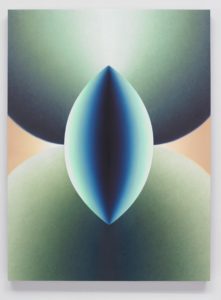
From the Beginning (inversed), 2017
Oil paint, acrylic medium, sawdust, and high-density foam on linen mounted on panel
48 × 36 × 3-1/2 inches
by Loie Hallowell
Ursula Le Guin’s five elements, which must work together “in one insoluble unitary movement” in order to produce good writing:
The patterns of the language — the sounds of words.
(The effectiveness and understanding of individual design elements.)
The patterns of syntax and grammar; the way the words and sentences connect themselves together; the ways their connections interconnect to form the larger units (paragraphs, sections, chapters); hence the movement of the work, its tempo, pace, gait, and shape in time.
(The interconnectedness of the design elements into a larger design, producing rhythm, vibration, excitement, focus and eye control.)
The patterns of the images: what the words make us or let us see with the mind’s eye or sense imaginatively.
(What these design elements are able to conjure; what associations we can draw from these elements. What do abstract elements signal in our imagination?)
The patterns of the ideas: what the words and the narration of events make us understand, or use our understanding upon.
(What meaning can we draw from the arrangement of abstract, objective or narrative elements in a picture? What is its relevance to a universal human truth?)
The patterns of the feelings: what the words and the narration, by using all the above means, make us experience emotionally or spiritually, in areas of our being not directly accessible to or expressible in words.
(What does the overall work make us experience emotionally or spiritually, in areas of our being not directly accessible to or expressible in words or visual language?)
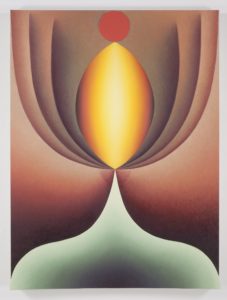
A Gentle Meeting of Tips, 2018
Oil paint, acrylic medium, sawdust, and high-density foam on linen mounted on panel
48 × 36 × 3-1/2 inches
by Loie Hallowell
Sincerely,
Sara
PS: “All makers must leave room for the acts of the spirit. But they have to work hard and carefully, and wait patiently, to deserve them.” (Ursula Le Guin)
Esoterica: Le Guin’s five elements introduce the notion of “idea” late in the process. Here’s an idea: Pretend you have an “idea” to paint an abstracted landscape of a farm, with a barn, and a tree, and an animal in the picture. Now reverse engineer this idea to pinpoint a “vibe.” For this scenario, the vibe could be “bucolic pleasure” or “wistfulness” or “fecundity” or “work.” This “vibe-identifying” is something most of us are already doing intuitively with subject-driven work, but it’s still fun to apply a Le Guin-style abstraction of elements to the process. Now assemble some singular design components that can be used for a pattern that can produce a rhythm (Le Guin’s “sounds”.) Are you still with me? Are you still on vibe? Working down her list in order, build a picture, knowing that you’ll arrive at its most important pattern – its emotional experience – at the end. In doing so, you inch closer to expressing what cannot be articulated. “There is a relationship, a reciprocity between the words and the images, ideas, and emotions evoked by those words: the stronger that relationship, the stronger the work,” wrote Le Guin. “To believe that you can achieve meaning or feeling without coherent, integrated patterning of the sounds, the rhythms, the sentence structures, the images, is like believing you can go for a walk without bones.”
Have you considered a Premium Artist Listing? With each letter, an artist is featured at the bottom of this page. The Premium Artist Listings are a means of connecting artist subscribers through their work. Proceeds from each listing contribute to the production of The Painter’s Keys.
“It is above all by the imagination that we achieve perception, compassion and hope.” (Ursula K. LeGuin)
Featured Workshop
October 17 – 23, 2022
San Miguel de Allende
Painting Mentor – Amit Janco: Artist, Author, Labyrinth Designer, Founder of Heartshops and Retreat on Your Feet (Creativity and Walking Retreats)
Join this 7-day journey through self-expression to unleash your bottled-up creativity, with a brush in hand – and openness in your heart. Calling non-artists too! Each day, you’ll stand up to paint; yes, you’ll be painting on your feet, and moving about – thereby activating the brain, the body and ALL senses. No need to come with a plan; watch the colors and brushstrokes come alive; and see the magic and mysteries unfold, as you greet your square of paper anew, every day. Our accommodations and studio are in an enchanting former bordello, just a stone’s throw away from San Miguel’s historic center, with its gardens, cobblestoned alleys and marvelous colonial architecture. Inspiration abounds!
Details at https://amitjanco.com/
Featured Artist
My art, like my art making practice is about discovery. The alluring push and pull of wet pigment on the surface, the intermingling of colors joining to make new hues in an ever-changing kaleidoscope of shapes and textures. Gently nudging the chaos is exciting and keeps me motivated to make art. Each piece provides unique challenges. Those challenges open the door to my inner world and help me understand more about myself and my relationship to the outer world.
The resulting images from my practice often have aquatic themes. Water has been a big part of my life and those memories come back again and again. Often my audience tell me they sense a spiritual element in my work, and they feel the works are meditative. I love that my audience senses that and it reminds me of our connectedness.

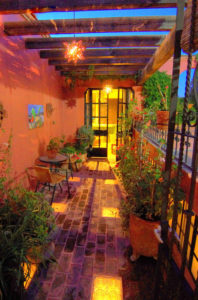
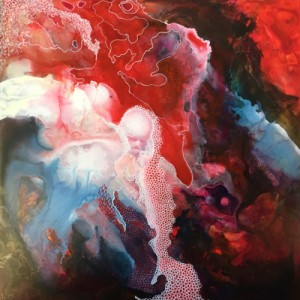
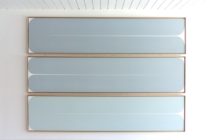
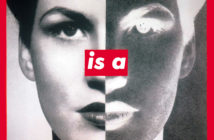
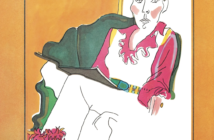
20 Comments
“The writings of Sara Genn meet at the intersection of poetic & informative.”
– Miles Patrick Yohnke
The article: “Where do you get your ideas from?” is essential reading for humankind.
Here is another essential material. A 5-minute video from Harry Chapin that is idea related. Painted related. Life related: https://www.youtube.com/watch?v=7qrbNygL0YU
If you like that and want to dive deeper into what Harry Chapin is talking about here are two articles of mine
Performing Without a Net:
salmonstudio.wixsite.com/yohnke/post/performing-without-a-net
A New Platform for Living:
salmonstudio.wixsite.com/yohnke/post/a-new-platform-for-living
As always, love is the way,
Miles Patrick Yohnke
Please just copy & paste those two URLs. Thank you!
Thank you Sara and Miles. I love this, and had written this week ” Feel more, paint less. Feel more, think less” editing my previous edict – ”Think more, paint less” (Sebastian Capella)
May all who want to pull down their inspirations from the heavenly realms, do so!
Dear Carole,
I’m deeply touched by your reply on many levels. First for reading, watching the materials. Then investing your time in replying. Replying by sharing your heart. Your ‘feelings’. So many lives never open up. Share their feelings. That: “what will people think?” And thus they do nothing. They become a self-made prisoner of their own self. It is really hard to say anything of deep importance in your art, whatever your medium is in this state of existence.
When I visited your website I was expecting to learn of a young lady from your tone found in your reply. I have even more respect for your reply. You being married for 53 years. Yet, you want to be more. You haven’t lost that child-like spirit. You still are seeing the world with infant eyes. I commend you for this.
Feeling is everything. Sharing your feelings. Pouring your heart into all those you come into contact with. Finding their strengths and telling them. Lift them up. In doing so you will be lifted up. Pouring your feelings into your art. One’s art has to come from their heART. Just pouring it in. So passionate to free oneself . But for me – the key is it has to get to a point where it has nothing to do about you. Everything is channelled for ‘them’. That the viewer, the reader, the listener finds themselves in the art. That they ‘feel’. Feel so much that it inspires them to soaring levels and they pass it on in their profession. In the end that we are all mending each other. That we all feel connected.
In recent years we hear about ‘social distancing’. But the really is we have been social distancing since the being of time. Scared to show our feelings. It’s time we all come together. As one soul sharing community. There is unity in commUNITY!
I can’t help to think of next weekend and Father’s Day. Sara, James & Dave Genn can’t visit their dad. Their dad selflessly started this Painter’s Key’s community to help bring us all together. He did it for free. How much of his time did he invest in all of us? This is never lost on me. He poured his feelings into us with the hopes we’d become better people. That we would pass it on to make a better planet.
At some point in our lives it has to become nothing about us. That our whole lives are poured into others. When we reach this place it than has real meaning. Real purpose.
I’d like to thank Nader as well for his time. His comments. For others that have read. Thank you so very much for your time. For your lives.
R.I.P. (Rest In Painting) Robert Genn
As always, love is the way,
Miles Patrick Yohnke
Thank you, Sara. I appreciate your wisdom and your sharing.
After all, is said and done, as Miles points it, it is the love of doing something that wins the day.
The rest is intellect classifications as to ideas, etc.
But we are human and linear thinkers that we try to get away from in arts.
Then shall we say the invisible, the mystery of life and our own existence, is the king?
With much love to you and for the memory of Robert and appreciate what you are doing dear.
Nader
PS. I still think about your advice in the workshop we shared with your dad.,,
If you love it, you will find a way.
Thanks Sara, – I certainly was deeply influenced by Ursula Le Guin’s comments in ‘Where Do You Get Your Ideas From?”.
So much so in fact that I copied that text and made an A3 poster for my workroom wall. I firmly believe that they apply just as strongly to making paintings as to writing music and as to writing itself. Lovely to see this Painter’s Keys letter this morning (my time)! Thank you so much.
Anton
Most of my paintings just come from moving the paint around until I like it or I see something. To develop. Lately l have had visions and concept as the source. Any approach that takes you there is good.
If I read LeGuin correctly (i.e. without distorting her points too much) the act and art of writing is an aesthetic experience of creation which affords an aesthetic experience by others who contemplate it. Art according to LeGuin isn’t about a barn or tree; it isn’t about excited feeling or even love, unless it’s love of art. The aesthetic process depends on intensity of focus which yields a multiple, simultaneous awareness of the whole and the microscopic detail of all its constituents. In her fiction and in this essay LeGuin is so precise — le mot juste (words), the order of presentation (syntax), the form of the work. She is not carried along by “inspiration” or desire to communicate anything beyond the structure of her written creation. Her work is exact, the result of long practice in the fundamental skills of her art. When she refers to people who think good writers are magicians, she refers to people who, by their own poor skills or lack of them, are not operating at the same level of artistry and who insist on translating an aesthetic experience into other kinds of experience.
Ask a musician about music. There may be emotion given off around the edges, but the essence of music is musical, just as the essence of writing is verbal and the essence of painting is visual form.
When she moves paint around until she likes what she sees, Rebecca Skelton is closer to what LeGuin is talking about than painters who begin with a preconceived subject (barn, tree) or who depend on other kinds of emotion to fuel their work experience.
As always, I am grateful for your newsletters. I don’t always have time to read them when they come in – but I love knowing they are available!!!
Thanks for the interesting article geometry dash lite; I thoroughly enjoyed it. Like this is how art should make you feel. Stunning, truly stunning.
Thanks for sharing this best stuff with us! Keep sharing! I am new to blog writing. All types of blogs and posts are not helpful for the readers. Here the author gives good thoughts and suggestions to each and every reader through this article. literature-essay Quality of the content is the main element someone write my assignment of the blog and this is the way of writing and presenting.
I just wanted to drop by and say how much I enjoy reading your blog. Keep up the fantastic work Ted Lasso Jason Sudeikis Backpack
Ursula Kroeber Le Guin was an American author best known for her works of speculative fiction, including science fiction works set in her Hainish universe. Le Guin makes the case that our desires to create stories out of our lives is part of how people remain sane. Ursula K. Le Guin’s piece titled “Where Do You Get You Ideas From” is often regarded by most as an important piece of literature to help the modern writer.
I really amazed to read this blog post. It is so unique and informative. halloween costumes with a leather jacket
As always, I am grateful for your newsletters. I don’t always have time to read them when they come in – but I love knowing they are available!!!
Valorant Phoenix Jacket
Are you still with me? Candy Crush
Trust our expertise for fast, reliable, and legally compliant attestation. degree certificate attestation in UAE
I really impress by this blog! the way you shared your paintings was amazing, other than that if you’re looking for some really cool design hoodies, check out this Eminem Barry Sanders Blue Hoodie.
I highly appreciate your faux leather vest mens work and research. Thank you